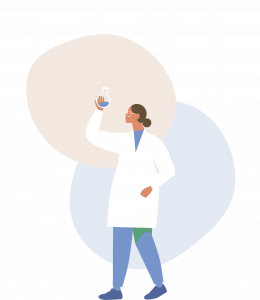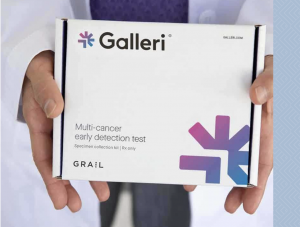Cancer-Detection Blood Tests
- Researchers from the United States government are planning a large experiment that could last seven years to see if cancer-detection blood tests can really save lives. "We don't have definitive data that shows that they will reduce the risk of dying from cancer," says Dr. Lori Minasian, a deputy director at the National Cancer Institute who is involved in planning the research of this study.
- Cancer detection company GRAIL gained notoriety after releasing Galleri a multi-cancer early detection blood test. According to GRAIL, the test can detect cancer signals across more than 50 different forms of the disease. One thing to consider, however, is that the test’s ability to localize a "cancer detected" signal to the correct organ of origin depends greatly on the type of cancer as well as the stage.
- Other blood tests that are available or in development at the moment include Aristotle, PanSeer and Delfi.
"[The tests] sound wonderful, but we don't have enough information," Dr. Lori Minasian, a deputy director at the National Cancer Institute who is involved in planning the research of this study, told the Associated Press. "We don't have definitive data that shows that they will reduce the risk of dying from cancer."
Read More One blood test that can reportedly detect more than 50 different types of cancer at early stages has seen a lot of press lately. But there are also other similar tests on the market or in development. Below, we’ve sorted through the facts by creating a SurvivorNet guide to early cancer-detecting blood tests.
One blood test that can reportedly detect more than 50 different types of cancer at early stages has seen a lot of press lately. But there are also other similar tests on the market or in development. Below, we’ve sorted through the facts by creating a SurvivorNet guide to early cancer-detecting blood tests.Galleri
Overview:
First up is the test everyone’s talking about: Galleri. Cancer detection company GRAIL made headlines last summer after releasing this multi-cancer early detection blood test. According to GRAIL, the test can detect cancer signals across more than 50 different forms of the disease. And research published in June by the Annals of Oncology found that Galleri could detect signals for 45 types of cancer that lack recommended screening tests, during early stages of the disease. Still, further studies will be needed to determine which cancers these tests are best at detecting.
The clinical trial that provided the data for Galleri, which was presented at the 2021 American Society of Clinical Oncology meeting, pulled from the PATHFINDER study a prospective, multi-center study where researchers administered the blood tests to two groups: an elevated risk group based on smoking, family history or a personal history of cancer that made up a majority of participants and a non-elevated risk group. The rate of true positives, meaning the people whose tests detected cancer and actually had cancer, was numerically higher in a subgroup of patients who had additional risk factors beyond age, such as a history of smoking. Hence why one of our experts suggests that this test may be more useful for patients who have cancer risk factors such as obesity or smoking.
According to the Galleri website, the test is designed “to be used in addition to, and not replace, other cancer screening tests your healthcare provider recommends” and for “patients with an elevated risk of cancer due to age, such as those aged 50 or older.”
Availability:
Galleri is now available to residents in all 50 states, but it is only commercially available in the US. It is not currently approved by the U.S. Food and Drug Administration. Access to the test requires a prescription from a licensed healthcare provider and that means you have to either refer your healthcare provider to Galleri who will then reach out with education and training or request the test online through Genome Medical, an independent telemedicine healthcare provider that has partnered with Galleri.

In addition, Galleri is also a part of a trial launched by the National Health Service in England, where participants who have not had a cancer diagnosis in the last three years will be asked to give a blood sample at a mobile clinic. They will then be invited back after 12 months, and again at two years, to give more samples with the goal being to find out if the test can significantly reduce the number of cancers diagnosed at a late stage.
Grail is also planning to pursue full FDA approval in 2023.
How it Works:
First, you must request the test. Then, if your test is approved, you’ll schedule a time for a blood draw. Once your blood has been collected, the test analyzes cell-free DNA (cfDNA) degraded fragments of DNA released into the blood after leaving the confines of all cells in your body, including cancer cells. This is helpful because cancer patients have increasingly high cfDNA numbers since the tumors inside their bodies are shedding and depositing fragmented DNA into the bloodstream with different tumor types releasing different amounts of cfDNA.
The cfDNA from cancer cells is different from the cfDNA of healthy cells. cfDNA from cancer cells have specific methylation patterns that identify it as cancer. DNA methylation is a normal process used by cells that turns genes on and off in the human body, however different cancers have specific patterns of methylation that can be recognized. So, the test also works by looking at the methylation patterns of the DNA in your blood to determine if any of it may have come from cancer cells. It’s important to note, however, that the test’s ability to localize a "cancer detected" signal to the correct organ of origin depends greatly on the type of cancer as well as the stage.
Results should be ready about 2 weeks after your blood draw.
Cost:
The list price is $949. It may be health savings account (HSA) and flexible spending account (FSA) eligible, but it is not currently covered by insurance.
What’s Being Said:
The test that some doctors are calling a "game-changer" is not perfect, but it has received praise.
"Finding cancer early, when treatment is more likely to be successful, is one of the most significant opportunities we have to reduce the burden of cancer," Dr. Eric Klein, lead author of the Galleri study published in June and chairman of the Glickman Urological and Kidney Institute, said. "These data suggest that, if used alongside existing screening tests, the multi-cancer detection test could have a profound impact on how cancer is detected and, ultimately, on public health."
Aristotle
Overview:
Aristotle is another blood test marketed to detect multiple forms of cancer at early stages. It was developed by Stage Zero Life Sciences, a company that utilizes advanced mRNA gene expression technology. These cancers include breast, ovarian, cervical, endometrial, liver, colorectal, stomach and prostate cancer.
Availability:
Aristotle has not been approved by the U.S. Food and Drug Administration. StageZero Life Sciences announced in October that patients in Virginia and the Washington, D.C. metropolitan area (D.C., Md., Va.) could directly access Aristotle via its laboratory in Richmond, Virginia, as a part of the company’s efforts to expand direct access to its services. StageZero also announced that its multi-cancer blood test would be available to those living in the Greater Toronto, Canada, area via collaborations with local clinics.
The Aristotle test must be prescribed by a physician, but beyond the clinics, people can access the test through AVRT, the company’s comprehensive telehealth program. AVRT is now also available in the United Kingdom.
How it Works:
Messenger RNA (mRNA) is genetic material that tells your body how to make proteins. Changes in mRNA expression can be measured in the blood and serve as an early cancer indicator, according to StageZero Life Sciences. They discovered this principle, named it the Sentinel Principle​, and used this technology to develop Aristotle. The test requires a single blood sample.
Cost:
The cost of Aristotle is $1,500, according to BioSpace.
What’s Being Said?
“Far too often, cancer is diagnosed and treated at a late stage, which can dramatically decrease survival rates and affect patients’ quality of life,” James Howard-Tripp, Chairman and CEO of StageZero Life Sciences, said. “This is more of an issue now, with the COVID-19 pandemic having significantly reduced patient/physician interactions. We are seeing a wave of late-stage diagnoses… Use of a blood test that looks for the most common forms of treatable cancers can help reduce the risk of developing advanced-stage cancer through early detection. We believe that providing an opportunity to find cancer early will facilitate more favorable outcomes.”
PanSeer
Overview:
PanSeer is a blood test being developed by Singlera Genomics and studied by University of California San Diego's Department of Bioengineering. It can detect stomach, esophageal, colorectal, lung and liver cancer.
Availability:
This test is currently for research use only. A next step in its development would likely require a prospective cohort study and clinical trial. But a prospective study requires ample time and resources, so Singlera Genomics is trying to raise additional funds.
How it Works:
This test uses circulating tumor methylated DNA (ctmDNA) to detect cancer meaning that it looks for tumor-specific methylation patterns chemical changes that occur with the DNA in the earliest stages of cancer.
Cost:
There are no associated costs yet.
What’s Being Said?
"The ultimate goal would be performing blood tests like this routinely during annual health checkups," Kun Zhang, UCSD Bioengineering Department chair, said. "But the immediate focus is to test people at higher risk, based on family history, age or other known risk factors."
Delfi
Overview:
Delfi, or DNA evaluation of fragments for early interception, is another blood test from researchers at Johns Hopkins Kimmel Cancer Center. This test is designed to detect lung cancer in high-risk individuals, but the hope is that they will be able to expand this technology to create more tests for other cancers and eventually create a multi-cancer detecting test.
We Need To Be Catching Lung Cancer Early Survivor Amanda Kouri Advocates For New Detection Methods
Availability:
Delfi is not currently available to patients, as it is still being developed in the research/investigational setting.
How it Works:
This tests work by analyzing cell-free DNA (cfDNA) fragmentation because researchers have found that certain fragmentation abnormalities do not occur with other types of disease. The technology is derived from comparing an individual's cell-free DNA patterns against populations with and without cancer.
Cost:
The cost has not yet been determined.
What’s Being Said?
“We are hoping over time to expand it to other individual cancers… maybe eventually into a multi cancer test, but the initial test will be a high-risk lung cancer screening test,” Nic Dracopoli, Delfi’s chief scientific officer, told SurvivorNet. “We haven’t basically done the clinical studies in other cancers. We have done preliminary work, research work, to show that these cell-free DNA fragmentation abnormalities are found in every cancer that we’ve looked at, and we expect them to be present in every cancer.”
Learn more about SurvivorNet's rigorous medical review process.

